World
EU recalls envoy who said buying Russian gas was ‘blood money’
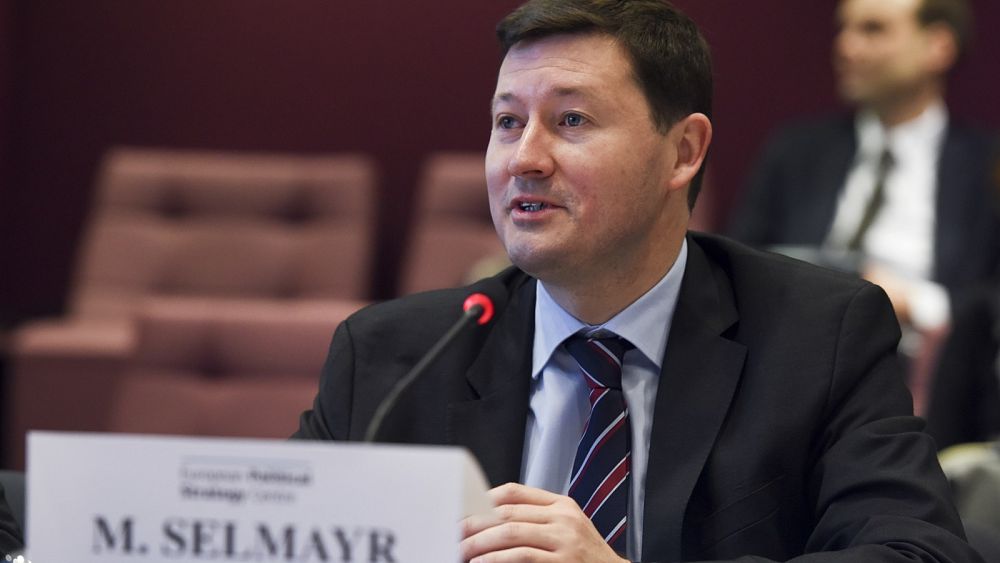
The European Commission has issued a stern rebuke against its top representative in Vienna, Martin Selmayr, after he said Austria’s continued purchases of Russian gas amounted to “blood money”.
“Oh my God, 55% of Austrian gas still comes from Russia,” Selmayr said on Wednesday while taking part in a discussion at an art fair in Vienna.
“That surprises me because blood money is sent to Russia every day with the gas bill.”
The unusually blunt remarks, reported by Austrian media, were met with a furious response by the conservative ruling party (ÖVP) and led to Selmayr being summoned to the Foreign Affairs Ministry for a meeting.
Karoline Edtstadler, the minister for EU affairs at the Austrian Chancellery, described the “blood money” remarks as “dubious,” “counterproductive” and “completely one-sided.”
“It is unfortunate that even an EU official does not seem to be familiar with certain facts,” Edtstadler said, according to the public broadcaster ORF.
The far-right Freedom Party of Austria (FPÖ), which is currently ranked first in opinion polls, denounced Selmayr and called for his immediate dismissal. The Greens and the Liberals, however, expressed their agreement with the characterisation.
Selmayr’s office did not immediately reply to a Euronews request.
‘Unnecessary and inappropriate’
In a statement shared with Die Presse, an Austrian newspaper, Selmayr said his comments were a reaction to a man in the audience who had accused the European Union and, in particular, European Commission President Ursula von der Leyen of “warmongering” and having “blood” in her hands.
Speaking to reporters on Friday afternoon, Balazs Ujvari, a spokesperson for the European Commission, said Selymayr’s choice of words was “not only unnecessary but also inappropriate” and breached the protocol standards that its representatives were expected to abide by.
Selmayr has been called for consultations with his hierarchical supervisor and will arrive in Brussels “in the near future,” the spokesperson confirmed.
“Diplomacy is not just about the right content, but it’s also about the right tone. Envoys (…) must weigh every word carefully because they play an important role as trusted messengers between us and the host government,” Ujvari said.
“It’s one thing to make a point on substance, it’s another question how we make that point.”
Ujvari refused to enter what he called “linguistic discussions” to clarify what exactly made the “blood money” comments so inadequate and how they differed from previous statements made by other EU officials calling for an end to Russian fossil fuels.
“The same rules apply to all members of personnel so what we expect from our members of personnel is to speak with proportionality, with discretion and select their words with due care. I believe this doesn’t depend on the country (where they reside),” Ujvari said.
Asked whether defending von der Leyen justified the language, Dana Spinant, the Commission’s deputy spokesperson, intervened to make a point.
“It is important that when we defend Europe or the actions of the European Commission (…) we do so while using a tonality and wording that keep the channels with communications open with the countries where our envoys are being posted. If we are insulted, which sometimes are, it is important not to answer back with the same means,” Spinant said, noting she was not referring to the specific case at hand.
“In general, we need to be sober when we enter into conversations.”
The spokespeople added the EU executive had engaged in bilateral talks with the Austrian government before issuing its public rebuke.
A well-documented dependency
This is not the first time that Austria has been under scrutiny for its continued reliance on Russian gas, which it obtains through a pipeline that the Kremlin maintains open. Unlike coal and seaborne oil, imports of Russian gas are not banned under EU sanctions.
Before the start of the invasion, Austria used to buy nearly 80% of its gas from Russia, a proportion that began falling in the aftermath of the war. In recent months, however, the share has increased and hit 60% in June.
The increase in dependency has been subject to extensive media coverage, including by Euronews, Le Monde and the New York Times, and has made Austria one of the few outliers in the European Union, where most member states have taken expensive measures to break free from Russia’s energy imports.
The European Commission has put in place a plan, dubbed “REPowerEU,” to wean the bloc completely off Russian fossil fuels and drastically ramp up the deployment of renewable systems.
“REPowerEU” has since become a flagship initiative, permeating other policy fields and even decorating the Commission’s headquarters in Brussels.
In September last year, European Commission President Ursula von der Leyen announced plans to cap the price of Russian gas imports, arguing the continued purchases were helping the Kremlin cushion the impact of sanctions. (The plans were later abandoned and never turned into a legal proposal.)
“We all know that our sanctions are deeply grinding into the Russian economy, with a heavy negative impact. But Putin is partially buffering (it) through fossil fuel revenues,” von der Leyen said in September.
“We must cut Russia’s revenues, which Putin uses to finance his atrocious war in Ukraine.”
Kadri Simson, the European commissioner for energy, has equally urged member states to phase out all gas imports from Russia and avoid signing new contracts once the existing arrangements expire.
“Gas supplies have been used as leverage to blackmail and divide Member States, to weaken the resolve to oppose an unjust and illegal war,” Simson said in March.
“Such actions made it crystal clear that the Union should put an end to (the) massive dependency we had on Russia, built over decades.”

World
Consejos para disfrutar de las celebraciones de fin de año, sin estrés
NUEVA YORK (AP) — Todos conocemos los factores de estrés: obligaciones sociales, rencillas familiares, divisiones políticas, estrés financiero y el deseo de mantenerse alegre y generoso todo el tiempo.
Así que aquí va un recordatorio sobre cómo desterrar a tu perfeccionista interior y disfrutar verdaderamente de la temporada festiva:
“Realmente ayuda dejar de lado algunos de los ‘deberías’”, dice Lynn F. Bufka, jefa de práctica de la Asociación Estadounidense de Psicología. “Decide cuál es la cosa que más importa, y las cosas que te brindan más alegría, y suelta las demás”.
Las tradiciones pueden cambiar y evolucionar, y cuanto más flexibles sean las cosas, más fácil será para todos, dice Bufka.
“Concentra tu energía en crear un espacio cálido para que las personas que amas se reúnan y relajen, se pongan al día y celebren unos a otros. Eso es literalmente todo lo que importa”, concuerda Lauren Iannotti, editora en jefe de Real Simple.
Algunos consejos:
Concéntrate en lo que te hace feliz
Podrías decidir que la conversación es tu objetivo principal y no preocuparte en absoluto por la decoración, dice Bufka. O si la decoración de la mesa es lo que amas, invierte tu energía allí y no te preocupes tanto por otros aspectos.
“Idealmente, debería tratarse de enfocarse en el amor, y eso no significa lo mismo para todos”, dice Bufka.
Permite que otros hagan las cosas por ti.
“La gente quiere ayudar, ¡déjalos!”, dice Iannotti. “Si no te ENCANTA cocinar todas esas guarniciones, o tienes poco tiempo, no hay ninguna vergüenza en aceptar que tu hermana haga el relleno. O busca ayuda de los profesionales: apoya a un restaurante local haciendo un pedido de catering”.
Otra opción es que “cada uno traiga un plato distintivo”, dice Ianotti. “Ahorrarás tiempo y dinero en la preparación y la cocina y tus invitados podrán mostrar sus habilidades”.
Darte permiso para tomar atajos
“Está bien si la casa está un poco desordenada o si la cena se sirve unos minutos tarde”, dice Iannotti. “Si las personas que has invitado están más interesadas en evaluar tu desempeño que en pasar un buen rato, pueden discutirlo con su terapeuta”. (Por cierto, no lo están, añade ella).
Y no dudes en dejar que la gente se sirva por sí misma, cuando sea posible. “Si no tienes tiempo para jugar a ser el barman, crea una bebida insignia con anticipación que puedas servir a todos tus invitados. También puedes simplemente dejar algunos mezcladores para que los invitados se sirvan y hagan sus propias creaciones”, sugiere Caroline Utz, directora editorial y de estrategia en The Spruce.
Está bien tener tiempo a solas
Las cosas funcionarán lo suficientemente bien si no lo supervisas todo, así que cuídate. Tómate pausas o caminatas si eso te ayuda a mantenerte centrado.
“Aunque el mindfulness se está convirtiendo en un término demasiado utilizado en la sociedad actual, hay algo valioso que podemos tomar de esto y aplicar a la temporada de fin de año”, dice Brook Choulet, psiquiatra deportiva y de rendimiento de concierge y fundadora de Choulet Performance Psychiatry.
Ella recomienda “programar microdescansos intencionales” para hacer algo que disfrutes.
“Por ejemplo, podrías programar una llamada telefónica con un amigo de otro estado, tomar un paseo de 15 minutos al aire libre, o incluso ajustar el temporizador y tomar un baño de 15 minutos sin interrupciones”, dijo.
Espera algo de discordia y no te alarmes por ello
“Si te preocupa la polarización y entrar en conversaciones incómodas, intenta pensar en maneras en que puedas terminar una conversación o cambiarla de dirección”, dice Bufka.
Ella recomienda preparar algunas frases de antemano para ayudar a terminar la conversación o cambiarla de dirección.
En resumen, tener la intención de una temporada festiva menos perfecta puede ser justo lo que necesitas.
___
Katherine Roth cubre temas de vida y estilo y otros temas para The Associated Press desde Nueva York.
___
Esta historia fue traducida del inglés por un editor de AP con la ayuda de una herramienta de inteligencia artificial generativa.
World
Azerbaijan Airlines plane headed to Russia crashes hundreds of miles off course, dozens feared dead
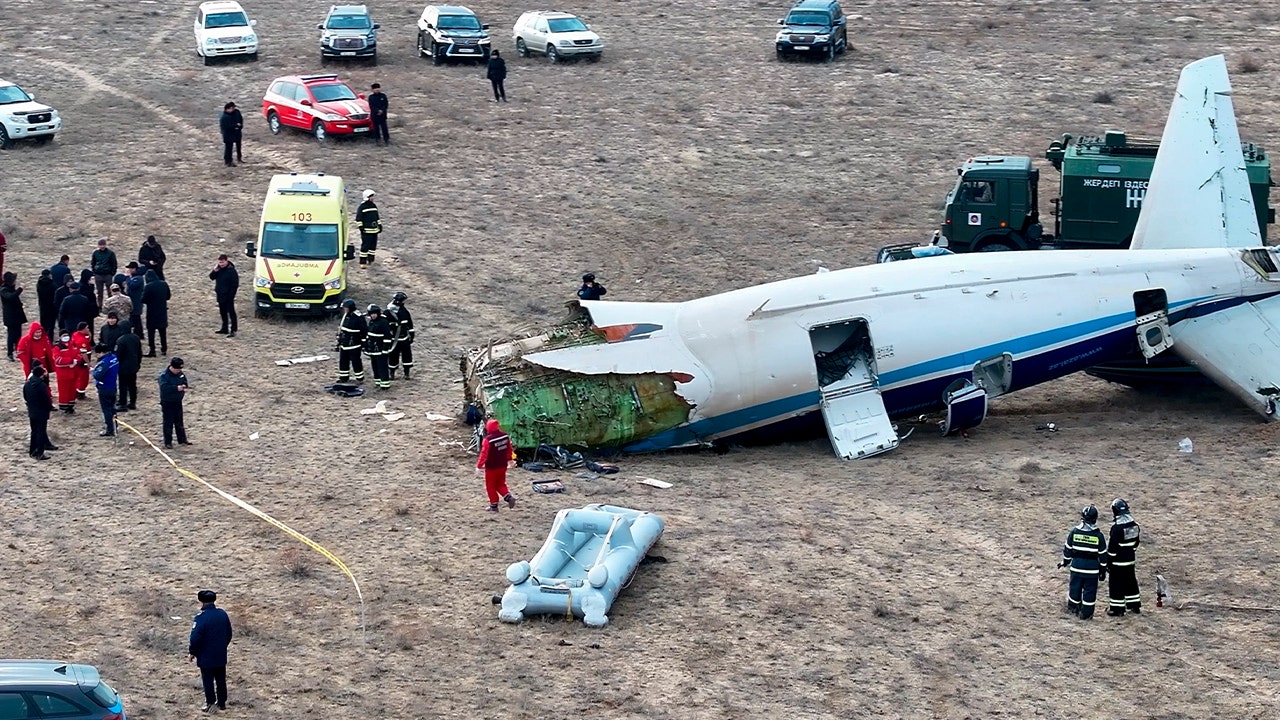
Dozens of passengers are feared dead after an Azerbaijan Airlines flight crashed near the city of Aktau in Kazakhstan on Wednesday, reports say.
The Embraer 190 passenger jet flying from Azerbaijan to Russia had 62 passengers and five crew on board, Kazakh authorities announced, saying 32 survivors had been rescued.
Flight J2-8243 had flown hundreds of miles off its scheduled route to crash on the opposite shore of the Caspian Sea. Officials did not immediately explain why it had crossed the sea, but the crash came shortly after drone strikes hit southern Russia. Drone activity has shut airports in the area in the past and the nearest Russian airport on the plane’s flight path was closed on Wednesday morning.
Russia’s aviation watchdog, meanwhile, said it was an emergency that may have been caused by a bird strike.
MORE THAN 30 DEAD IN BRAZIL BUS AND TRUCK COLLISION
In this photo taken from a video released by the administration of Mangystau region, the wreckage of Azerbaijan Airlines Embraer 190 lies on the ground near the airport of Aktau, Kazakhstan, Wednesday, Dec. 25, 2024. (The Administration of Mangystau Region/AP Photo)
Those aboard the plane included 42 Azerbaijani citizens, 16 Russian nationals, six Kazakhstani and three Kyrgyzstani citizens, according to Kazakhstani officials.
Russian news agency Interfax reported that both pilots died in the crash, citing a preliminary assessment by emergency workers at the scene. The news agency also quoted medical workers who stated that four bodies had been recovered from the crash so far.
A total of 29 survivors, including two children, have been hospitalized, the ministry told Russia’s state news agency, RIA Novosti, the Associated Press reported. Many passengers have yet to be accounted for.
MALAYSIA AGREES TO RESUME ‘NO FIND, NO FEE’ HUNT FOR FLIGHT MH370, 10 YEARS AFTER PLANE DISAPPEARED
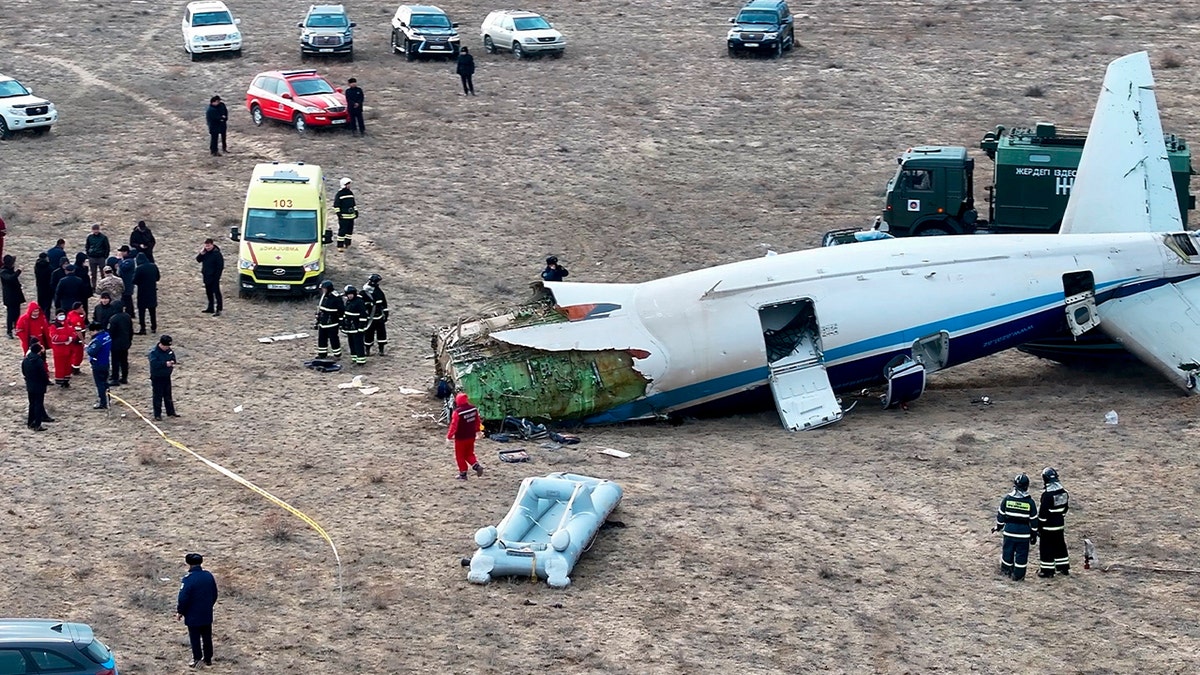
More than 30 are feared dead following the crash near the Kazakhstani city of Aktau. (Azamat Sarsenbayev/AP Photo)
Video of the crash showed the plane descending rapidly before bursting into flames as it hit the seashore, and thick black smoke then rising, Reuters reported. Bloodied and bruised passengers could be seen stumbling from a piece of the fuselage that had remained intact.
Azerbaijani President Ilham Aliyev, who had been traveling to Russia, returned to Azerbaijan upon hearing news of the crash, the president’s press service said. Aliyev was due to attend an informal meeting of leaders of the Commonwealth of Independent States, a bloc of former Soviet countries founded after the collapse of the Soviet Union, in St. Petersburg.
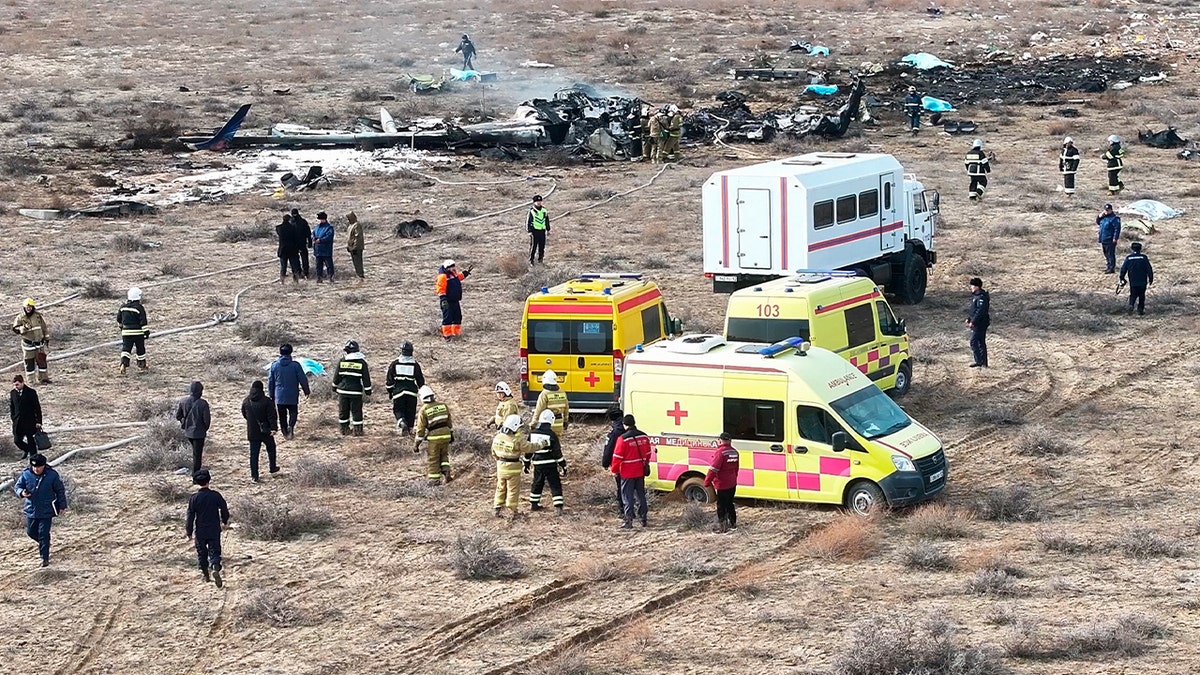
Emergency crews at the site of the Azerbaijani airliner crash on Dec. 25, 2024. (Azamat Sarsenbayev/AP Photo)
Aliyev expressed his condolences to the families of the victims in a statement on social media.
“It is with deep sadness that I express my condolences to the families of the victims and wish a speedy recovery to those injured,” he wrote.
He also signed a decree declaring Dec. 26 a day of mourning in Azerbaijan.
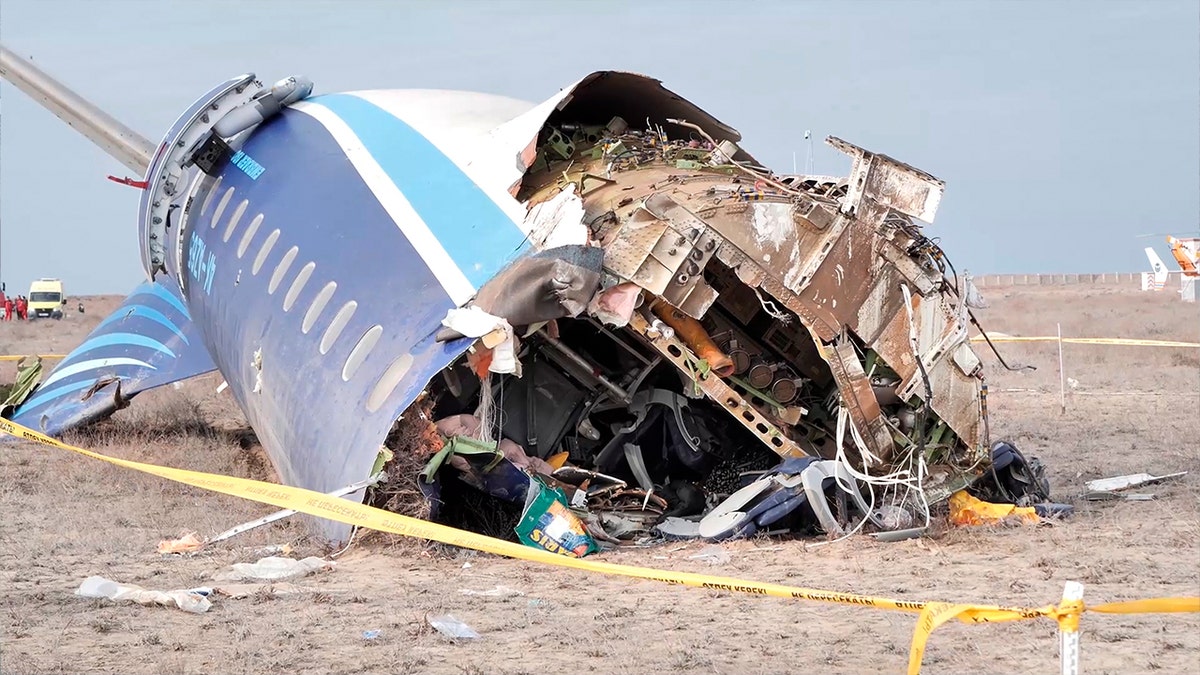
The plane was en route from the Azerbaijani capital of Baku to the Russian city of Grozny in the North Caucasus, the Associated Press reports. (The Administration of Mangystau Region/AP Photo)
In a statement, Azerbaijan Airlines said it would keep members of the public updated and changed its social media banners to solid black.
“We ask God for mercy on the passengers and crew members who lost their lives,” a translated statement on X said. “Their pain is our pain. We wish a speedy recovery to those injured.”
Reuters and the Associated Press contributed to this report.
World
Who is Europe's top investor in space in 2023?

Luxembourg remains Europe’s top investor in space in a year when defence spending on space exceeded civil space budgets for the first time since the 1990s.
Global public investment in space hit a record high of €106 billion in 2023, an 11% increase compared to 2022.
In Europe, the total funding was €11.9 billion, showing a modest 1% rise in its share of global space investment.
According to the European Space Agency, defence spending on space exceeded civil space budgets last year for the first time since the 1990s. Defence expenditures in space are projected to grow faster than civil spending, making up 53% of the budget in 2024.
The US continues to dominate global space investment, accounting for 64% of the total budget, while China holds a strong second place, growing its share from an estimated 2% in 2000 to 12% in 2023 through long-term programmes in both civil and defence.
Europe ranks third, contributing 11% of the global space budget in 2023.
What share of their GDP do EU countries spend on public space budgets?
Luxembourg remains Europe’s leading investor in space, dedicating 0.135% of its Gross Domestic Product (GDP) to the sector.
Globally, the country ranks third behind the US (0.262%) and Russia (0.169%).
In Europe, Luxembourg is followed by France, which invests 0.167% of its GDP, Italy at 0.103%, and Belgium at 0.095%.
On the other hand, private investment in space has continued to decline in 2023, dropping by 32% compared to 2022.
Europe also saw a 14% decrease in 2023 compared to the year before, with private space ventures receiving just below €980 million.
Although the US accounts for most of the global decline in 2023, its space sector continues to attract the largest share of investments at 60%, followed by Europe with 16% and China with 9%.
What was the state of space activity in 2023?
There were 221 orbital launches in 2023, an 18% increase compared to 2022.
Yet, a total of 212 launches were successful.
The US carried out more than half of the launches, with 96 of them conducted by SpaceX.
China accounted for 30% with 67 launches, a 5% increase from 2022, and Russia completed 19 launches.
The European launch service provider conducted three launches in 2023, including Europe’s first mission to Jupiter, which aimed to explore whether the planet’s three moons — Callisto, Europa, and Ganymede — could support life in their oceans.
Video editor • Mert Can Yilmaz
-
/cdn.vox-cdn.com/uploads/chorus_asset/file/24924653/236780_Google_AntiTrust_Trial_Custom_Art_CVirginia__0003_1.png)
/cdn.vox-cdn.com/uploads/chorus_asset/file/24924653/236780_Google_AntiTrust_Trial_Custom_Art_CVirginia__0003_1.png) Technology4 days ago
Technology4 days agoGoogle’s counteroffer to the government trying to break it up is unbundling Android apps
-

 News6 days ago
News6 days agoNovo Nordisk shares tumble as weight-loss drug trial data disappoints
-

 Politics5 days ago
Politics5 days agoIllegal immigrant sexually abused child in the U.S. after being removed from the country five times
-

 Entertainment6 days ago
Entertainment6 days ago'It's a little holiday gift': Inside the Weeknd's free Santa Monica show for his biggest fans
-

 Lifestyle6 days ago
Lifestyle6 days agoThink you can't dance? Get up and try these tips in our comic. We dare you!
-

 Technology1 week ago
Technology1 week agoFox News AI Newsletter: OpenAI responds to Elon Musk's lawsuit
-
/cdn.vox-cdn.com/uploads/chorus_asset/file/25672934/Metaphor_Key_Art_Horizontal.png)
/cdn.vox-cdn.com/uploads/chorus_asset/file/25672934/Metaphor_Key_Art_Horizontal.png) Technology24 hours ago
Technology24 hours agoThere’s a reason Metaphor: ReFantanzio’s battle music sounds as cool as it does
-

 News2 days ago
News2 days agoFrance’s new premier selects Eric Lombard as finance minister



















